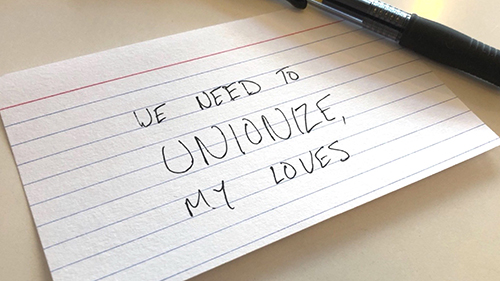Cross-post (16)
By:
June 4, 2020
Ethan Marcotte’s original post: How I write conference talks.
I’m writing a new talk. Since a few folks have asked, here’s what my process tends to look like:
- Several months before the conference, I’ll start researching my topic. For me, this mainly involves reading, and a lot of it. I’ll use Pinboard to store links to essays, articles, and tweets that seem relevant, and tag each link with something relevant to the conference.
- A month or two beforehand, I’ll start writing. But I won’t fire up a text editor right away. Instead, I’ll buy a stack of index cards, and start writing on them. Each card gets an idea I want to cover, like an item in an outline. But this is much, much less linear: I want things to be as unstructured as possible at this point.
- Jeremy tends to do this on a big sheet of paper, which I think is wonderful. I think you could easily use a digital tool like Mural to a similar effect.
- Once I’ve gotten most everything jotted down on several dozen cards, I’ll spread them out on a table, and group related cards together. After everything’s found a home, I’ll transfer the cards to a bulleted list. This is my outline.
- At this point, I’ll start writing. For most talks, this involves a weird jumble of outlining and prose. I rarely write out my talks in their entirety, instead preferring to keep things as conversational as possible. For this talk, I’m writing myself something a lot more detailed: it’s a proper script.
- I delete a bunch of words, since I suddenly realize they’re awful.
- I delete a few hundred more.
- Self-doubt begins to creep in. I remember that in another timeline, I went to graduate school. I wonder if it’s too late to throw in the towel on this whole “design” thing. Maybe I should move back north, see about working the family farm.
- I write a couple thousand words in one afternoon. Maybe this is doable.
- I write another introduction, replacing the one I’d written down a week or two prior. This one feels better.
- Then again, the last one felt pretty good.
- I write a paragraph about how racism informed the design work of a late, prominent architect. That’ll show ’em.
- I delete the paragraph I just wrote, as it was terrible.
- I close my laptop, and sit quietly for a minute.
- I put on my coat, and walk out of my apartment. The street outside is dark, save for a few streetlights at the far end. I remember the days are shorter now, and colder. I take a breath or two on the porch, listening to the traffic pass by on Highland. Near as I can tell, I’m the only person outside on my street. A block or two away—maybe more?—a dog barks, twice. Then, nothing. The neighborhood’s quiet again, save for me, breathing.
I step off my porch, and walk away from my building. I walk south, but not far—I come to the top of a nearby hill, where I can see the Cambridge skyline and, just past it, Boston proper. I stand there, in the shadow of a beautiful old cathedral, looking at this city that’s been my home for two decades. I think about the life I’ve made here, the friends I’ve made, the friends that moved away, the friends that stayed but I don’t see anymore, the friends I’ve lost. I think about my grandmother, and whether or not she’d approve of my new apartment—she only saw my last apartment once, the day after She and I got married. My grandmother had a little trouble with the front steps, but she had a grand old time once she got inside: she held court at one end of our living room, meeting new people, eating new food, and reaching down to pet our little cat whenever she came near.
A car passes by, its high beams bold, sharp; I raise my hands to cover my eyes, and it passes quickly. Then, nothing. Save for me, breathing.
It’s cold out here. Cold, and quiet.
- I walk back toward home, and settle back into work.
- Whenever the script’s done, I’ll start transferring it into Keynote. With a decent script or outline in place, this step should go relatively quickly.
- Be sure to leave plenty of time for rehearsal. Nothing improves a talk like a few runthroughs.
And that’s how I write my conference talks.
Ethan Marcotte’s original post: How I write conference talks.
Ethan’s website: ethanmarcotte.com
Ethan’s blog: ethanmarcotte.com/wrote/
Ethan on Twitter: @beep

